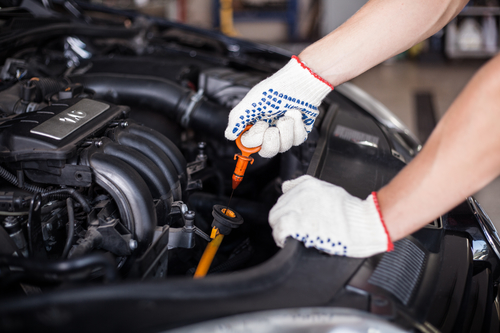Routine auto care and maintenance are the most important steps that you can take today to ensure a long life for your vehicle. Although each auto manufacturer has its own servicing schedule, there are some general guidelines that most drivers should be following.
First off, your owner’s manual will probably break things down between a regular (i.e., routine) or severe maintenance schedule based on how you drive and the conditions your vehicle’s frequently exposed to.
Things that might put your vehicle in the severe bracket are: a lot of stop-and-go driving and frequent idling, bumpy roads, extreme weather like subzero temperatures, and taking many short trips of five miles or less.
As you can probably tell from the above list, those conditions probably apply to many if not most fleet vehicles and service trucks. You don’t always get to pick the road or the weather when you’re delivering packages!
You can pick your auto care shop, though, and how often you get preventive maintenance on your vehicles. All Around Auto Repair does general care tuneups, brake repairs, engine and transmission servicing, fluid changes, and much more.
Auto Care 101: The Oil Change
 The preventive maintenance step that you’re probably most familiar with is getting an oil change. Auto care really starts here. Most car manufacturers say to change your oil about once every 3,000 miles, though you might be able to go slightly longer thanks to better car technology and new synthetic oil blends.
The preventive maintenance step that you’re probably most familiar with is getting an oil change. Auto care really starts here. Most car manufacturers say to change your oil about once every 3,000 miles, though you might be able to go slightly longer thanks to better car technology and new synthetic oil blends.
The longest that should go between oil changes is probably 10,000 miles. That’s for very mild driving conditions. For more severe driving conditions (e.g., a lot of stop-go driving and number of cold starts) you shouldn’t go more than 5,000 miles between oil changes.
At All Around Auto Repair your car will be treated right. You’ll be able to go longer between oil changes because the trained technicians at All Around Auto use a combination of synthetic and conventional oils for oil changes.
Mixing the two guarantees that your engine will stay lubricated for longer between oil changes. You might also check your owner’s manual because a lot of newer model cars, vans, and trucks have dynamic oil life monitors.
Oil life monitors track actual driving conditions and whether your driving is putting mild or severe wear on the engine. It used to be that cars just based an oil change around time or mileage in between changes.
Top Off Your Fluids and Get Filters Checked
The folks at the Car Care Council went to thousands of auto care shops and found that 25% of cars had dirty or low engine oil and that 18% had dirty air filters.
Low levels of engine oil mean that you’re not getting enough fuel economy out of your current vehicle, dirty cabin air filters might pose a risk to your health, and the 13% of drivers who had contaminated break fluid might not be able to break in time during an emergency.
It’s simply not worth the risk. When you come in for routine auto care at All Around Auto repair you’ll have your breaks professionally inspected and your automatic transmission fluid, coolant levels, and brake fluid checked.
The trained technicians at All Around Auto Repair are checking for optimal performance. For instance, did you know that low or contaminated brake fluid can lead to pedal fade, overheated brakes, corrosion, and a shorter life for your brake’s hydraulic components? It’s true.
Changing the cabin air filter as well as the engine air filter and fuel filter are essential for getting more life out of your current vehicles. Schedule an appointment today.

